Unit5 Art world Revision
文档属性
| 名称 | Unit5 Art world Revision | 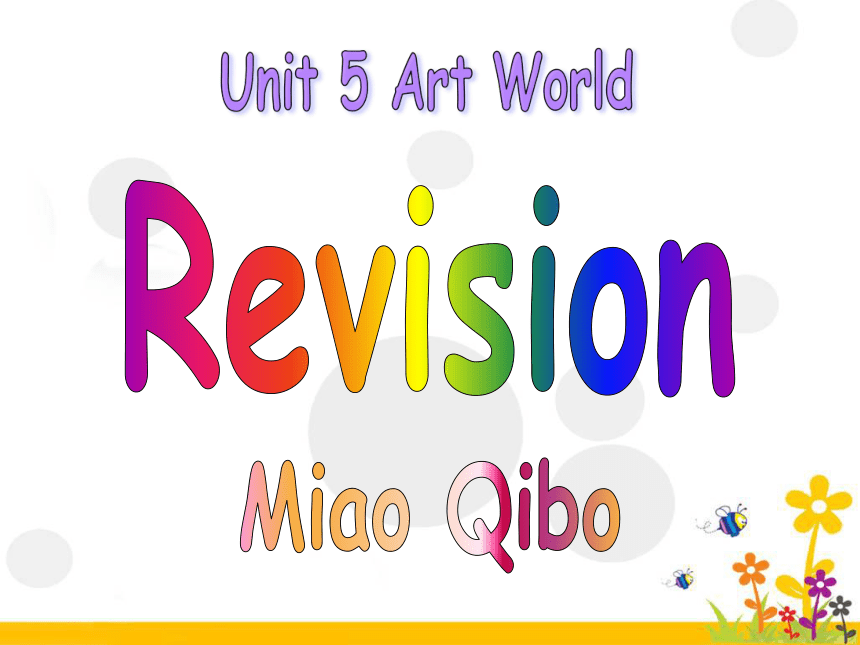 | |
| 格式 | zip | ||
| 文件大小 | 2.3MB | ||
| 资源类型 | 教案 | ||
| 版本资源 | 牛津译林版 | ||
| 科目 | 英语 | ||
| 更新时间 | 2014-11-16 19:16:31 | ||
图片预览

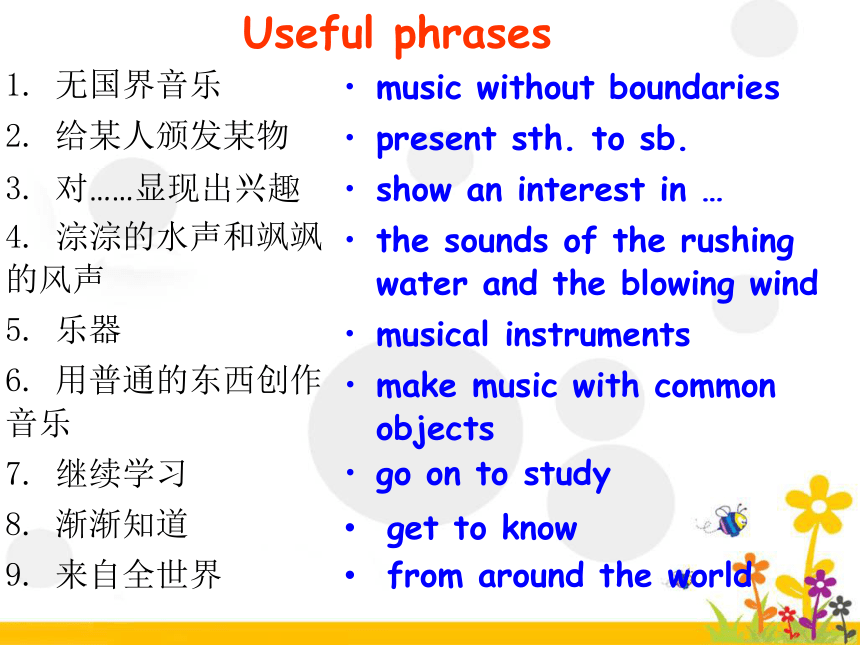
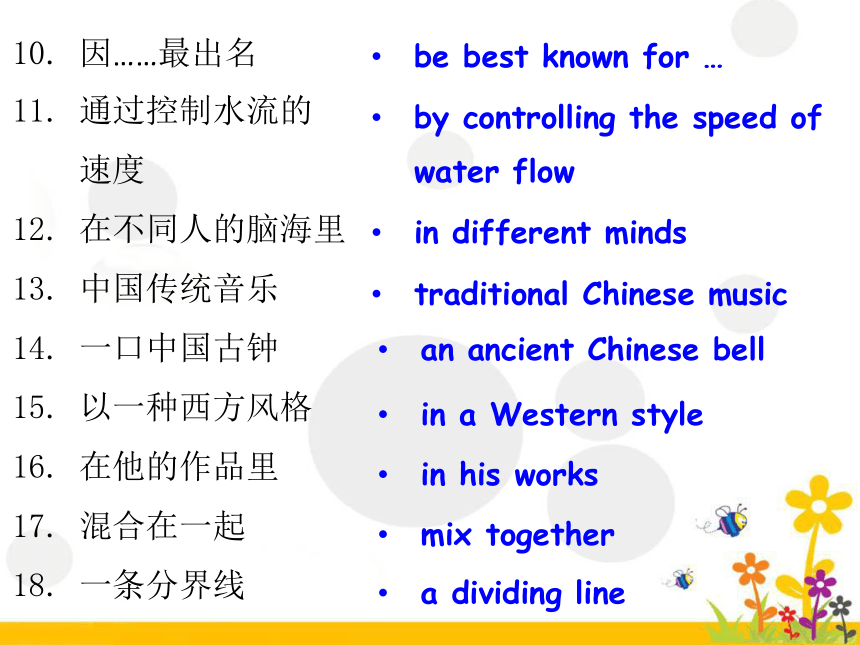
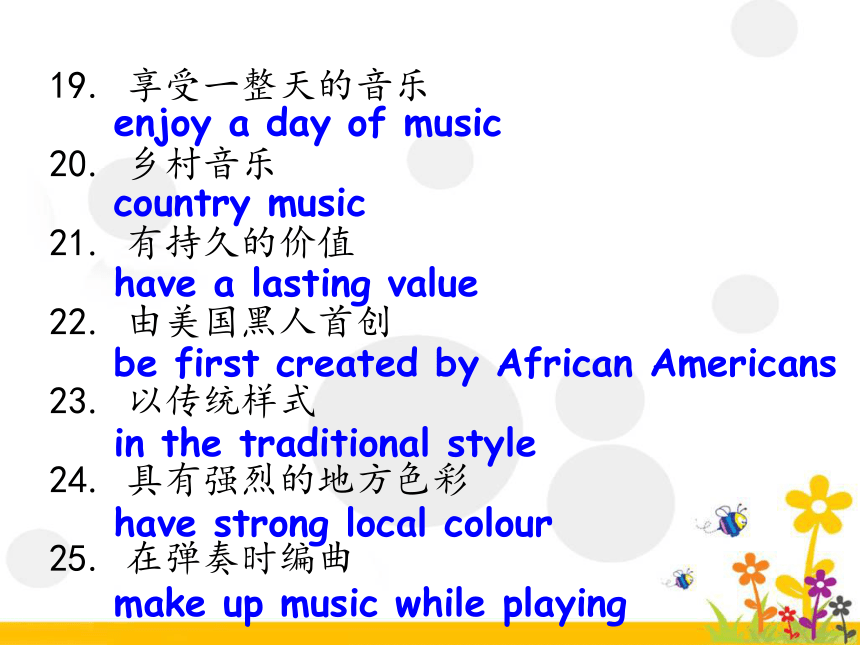
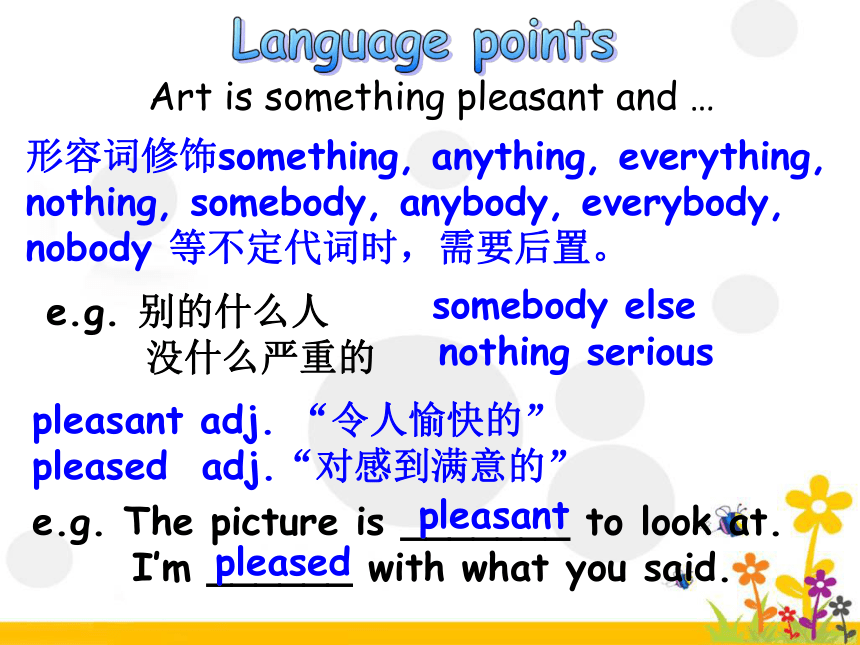
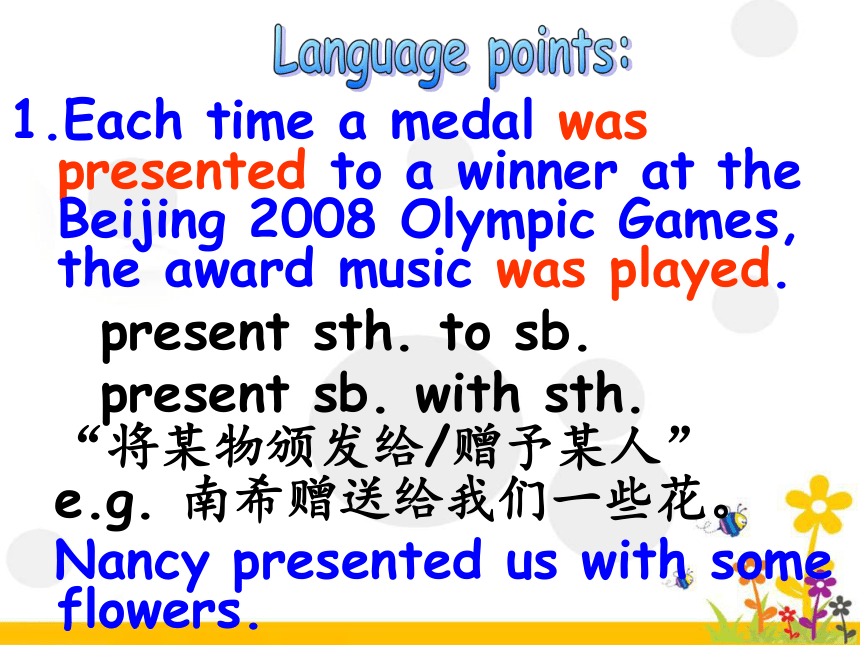
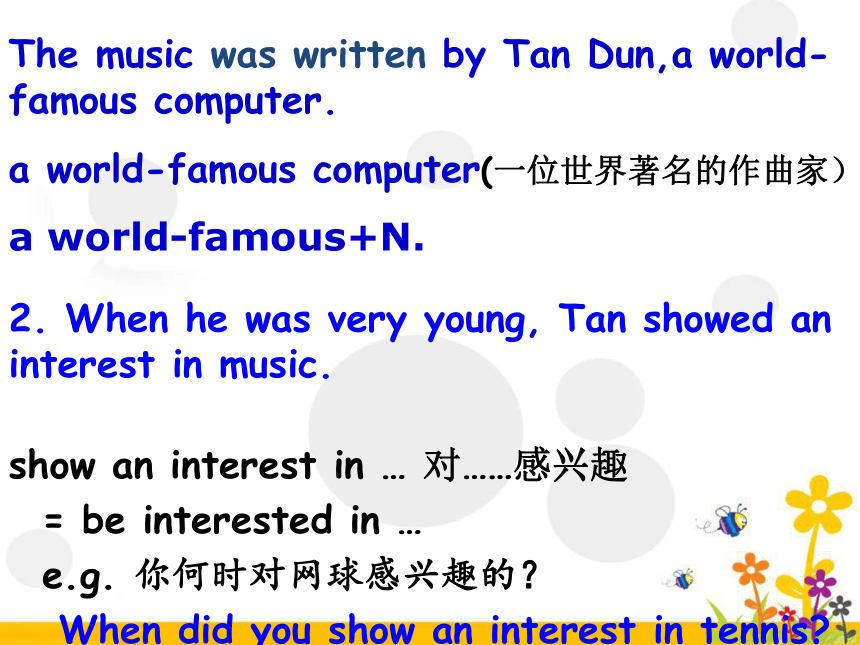
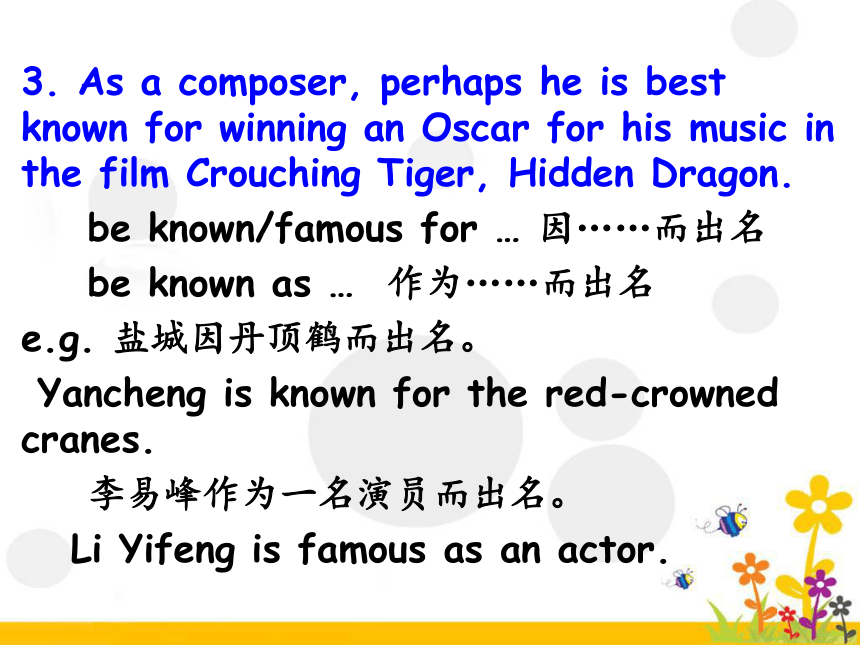
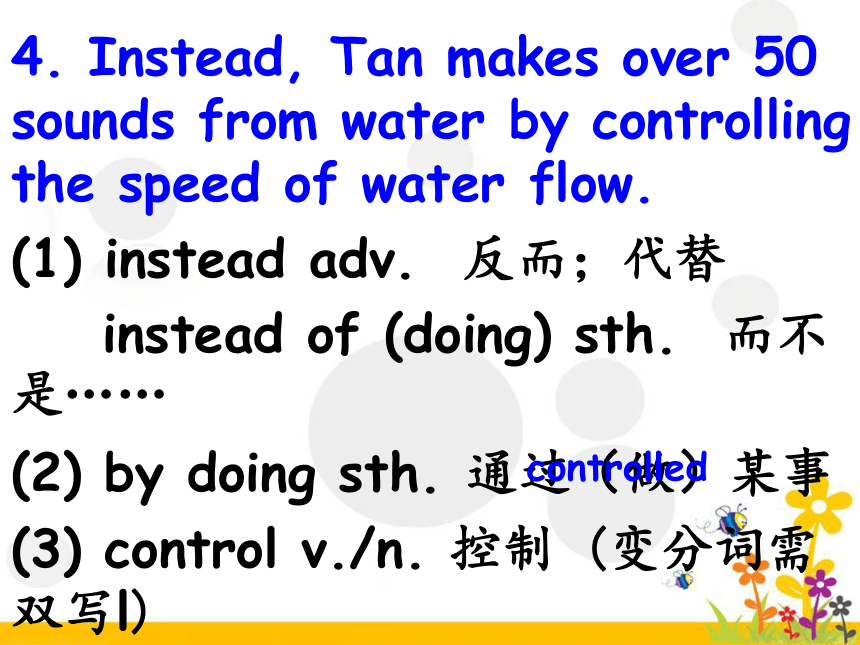
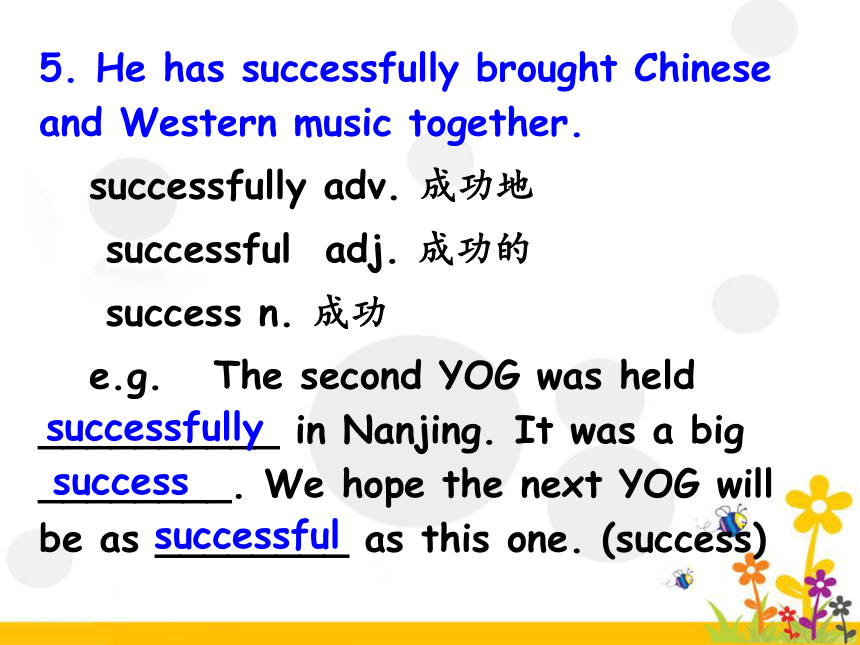
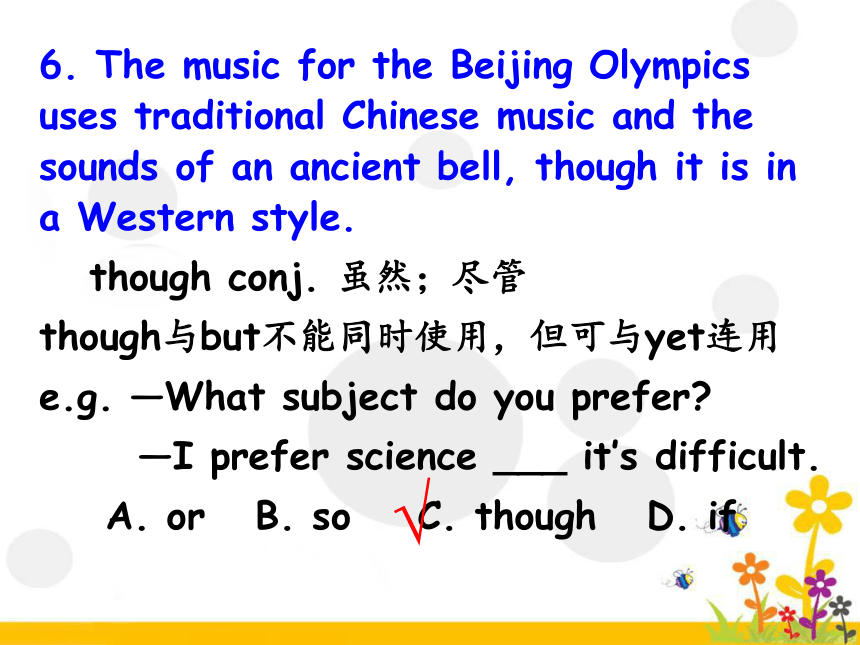
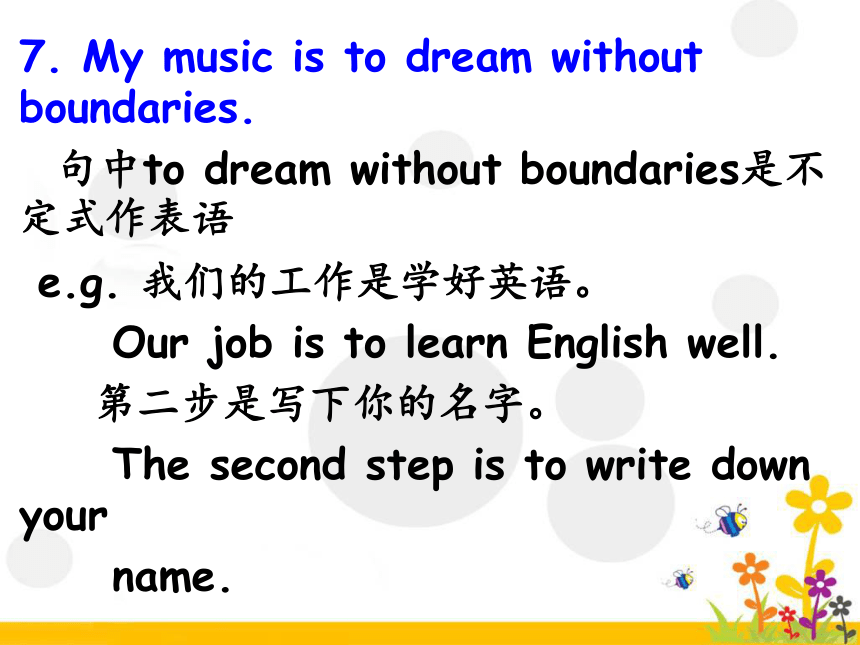
文档简介
课件31张PPT。RevisionUnit 5 Art WorldMiao Qibo1. 无国界音乐
2. 给某人颁发某物
3. 对……显现出兴趣
4. 淙淙的水声和飒飒的风声
5. 乐器
6. 用普通的东西创作音乐
7. 继续学习
8. 渐渐知道
9. 来自全世界Useful phrasesmusic without boundaries
present sth. to sb.
show an interest in …
the sounds of the rushing water and the blowing wind
musical instrumentsmake music with common objects get to know go on to study from around the world 10. 因……最出名
11. 通过控制水流的
速度
12. 在不同人的脑海里
13. 中国传统音乐
14. 一口中国古钟
15. 以一种西方风格
16. 在他的作品里
17. 混合在一起
18. 一条分界线be best known for …
by controlling the speed of water flow
in different minds
traditional Chinese musican ancient Chinese bell in a Western style
in his works
mix together
a dividing line enjoy a day of music
country music
have a lasting value
be first created by African Americans
in the traditional style
have strong local colour
make up music while playing
19. 享受一整天的音乐
20. 乡村音乐
21. 有持久的价值
22. 由美国黑人首创
23. 以传统样式
24. 具有强烈的地方色彩
25. 在弹奏时编曲
Art is something pleasant and …形容词修饰something, anything, everything, nothing, somebody, anybody, everybody, nobody 等不定代词时,需要后置。Language pointse.g. 别的什么人
没什么严重的somebody else nothing serious pleasant adj. “令人愉快的”
pleased adj.“对感到满意的”e.g. The picture is _______ to look at.
I’m ______ with what you said.pleasant pleased Each time a medal was presented to a winner at the Beijing 2008 Olympic Games, the award music was played.
present sth. to sb.
present sb. with sth.
“将某物颁发给/赠予某人”
e.g. 南希赠送给我们一些花。
Nancy presented us with some flowers.Language points:2. When he was very young, Tan showed an interest in music.
show an interest in … 对……感兴趣
= be interested in …
e.g. 你何时对网球感兴趣的?
When did you show an interest in tennis?The music was written by Tan Dun,a world-famous computer.
a world-famous computer(一位世界著名的作曲家)
a world-famous+N.3. As a composer, perhaps he is best known for winning an Oscar for his music in the film Crouching Tiger, Hidden Dragon.
be known/famous for … 因……而出名
be known as … 作为……而出名
e.g. 盐城因丹顶鹤而出名。
Yancheng is known for the red-crowned cranes.
李易峰作为一名演员而出名。
Li Yifeng is famous as an actor.4. Instead, Tan makes over 50 sounds from water by controlling the speed of water flow.
(1) instead adv. 反而;代替
instead of (doing) sth. 而不是……
by doing sth. 通过(做)某事
(3) control v./n. 控制 (变分词需双写l)
e.g. The traffic lights are ________(控制)by a central computer.controlled 5. He has successfully brought Chinese and Western music together.
successfully adv. 成功地
successful adj. 成功的
success n. 成功
e.g. The second YOG was held __________ in Nanjing. It was a big ________. We hope the next YOG will be as ________ as this one. (success) successfully success successful 6. The music for the Beijing Olympics uses traditional Chinese music and the sounds of an ancient bell, though it is in a Western style.
though conj. 虽然;尽管
though与but不能同时使用,但可与yet连用
e.g. —What subject do you prefer?
—I prefer science ___ it’s difficult.
A. or B. so C. though D. if √7. My music is to dream without boundaries.
句中to dream without boundaries是不定式作表语
e.g. 我们的工作是学好英语。
Our job is to learn English well.
第二步是写下你的名字。
The second step is to write down your
name.
I like him because his music makes me feel relaxed.
I like Tan Dun’s music because he uses the sounds of nature a lot.
I like Water best because it is very special.We often use because to answer why questions.We use because to introduce clauses(从句) of reason. Grammar A:
When do we use “because” to give reasons?Task One : Use “because” to give reasonsTan Dun was chosen to write music for the
Beijing Olympics because (一个完整的句子)We use “why” to ask for reasons. We use “because” to give reasons. We use “because” to give direct reasons.
直接原因Look and answer:A: Why are you wearing
a raincoat?B: Because it’s going to rain.A: Why does Mike go out?B: Because he wants to play basketball.A: Why does the boy eat the cake?B: Because he is hungry. I think.A: Why do they turn on the fan?B: Because it is too hot.We use to ask for reasons. We use to give reasons. The reasonthe resultWe use to give .
Its tone(语气) is strong. Working out the ruleswhybecausebecausedirect reasonsDraw a conclusion (结论):
1 When we use “why” to ask for reasons for
something, we use to give the reason.
2 We use “because” to give a reason.
3 We never use in sentences with “because”.
because direct so ______ her daughter hadn’t come back, _____ she looked worried.
Because; / B. Because; so
C. Though; but D. Thought; /Attention: We never use the conjunction so in sentences with because.√_______ it’s a program about manners and self-improvement, it’s worth watching.
_______ the hosts are humorous and funny, we like watching it very much.
_______ we’re busy with study, we can watch it to relax at weekends.
_______ the background music is beautiful, it attracts many musicians.
Since/As Since/As Since/As Since/As Grammar B:
When do we use “since/as” to give reasons?______ he had no musical instruments then, he made music with common objects like stones and paper.
_____ he likes the sounds of nature, Tan uses them a lot in his music.Since As and are also used to give reasons for something.
Usually the reasons are already .
Their tone is than .
and are used in the same way and have no difference in meaning.Working out the rulesSince as knownweakerbecauseSince as Draw a conclusion (结论):
1 We use “since/as” to give a reason.
2 In most cases, are interchangeable.
(大部分情况下) (可互换的)
And we use them in the same way here.known“since and as”PracticeAn art festival B1 Daniel decided to play the violin at the art festival since/as he is good at it.1. Daniel decided to play the violin at the art festival. He is good at it.
___________________________________
___________________________________
2. Kitty will dance at the song and dance show. She has to practise hard these days.
___________________________________
___________________________________
3. Sandy will design the posters for the art festival. She can draw very well.
___________________________________
___________________________________
Since/As Kitty will dance at the song and dance show, she has to practise hard these days.Sandy will design the posters for the art festival since/as she can draw very well. Since/As some students love painting and taking photos, there will be a students’ art show. Since/As the art festival is open to all students and parents, everybody is welcome.because since as 的用法区别 He introduced me because I was new.
Since you are going, I will go, too.
As it is raining, you’d better take a taxi.B2:Help Sandy complete her diary entry with because or since/as.out of breath
breath的词性是名词,意思是呼吸。短语out of breath的意思是气喘吁吁,上气不接下气。breath的动词形式时breathe,例如呼吸新鲜空气breathe fresh air,呼吸沉重breathe heavily。
last
last在文中的词性是动词,意思是持续。例如:这场雨会持续多久啊? How long?will?the rain last?Thank you!
2. 给某人颁发某物
3. 对……显现出兴趣
4. 淙淙的水声和飒飒的风声
5. 乐器
6. 用普通的东西创作音乐
7. 继续学习
8. 渐渐知道
9. 来自全世界Useful phrasesmusic without boundaries
present sth. to sb.
show an interest in …
the sounds of the rushing water and the blowing wind
musical instrumentsmake music with common objects get to know go on to study from around the world 10. 因……最出名
11. 通过控制水流的
速度
12. 在不同人的脑海里
13. 中国传统音乐
14. 一口中国古钟
15. 以一种西方风格
16. 在他的作品里
17. 混合在一起
18. 一条分界线be best known for …
by controlling the speed of water flow
in different minds
traditional Chinese musican ancient Chinese bell in a Western style
in his works
mix together
a dividing line enjoy a day of music
country music
have a lasting value
be first created by African Americans
in the traditional style
have strong local colour
make up music while playing
19. 享受一整天的音乐
20. 乡村音乐
21. 有持久的价值
22. 由美国黑人首创
23. 以传统样式
24. 具有强烈的地方色彩
25. 在弹奏时编曲
Art is something pleasant and …形容词修饰something, anything, everything, nothing, somebody, anybody, everybody, nobody 等不定代词时,需要后置。Language pointse.g. 别的什么人
没什么严重的somebody else nothing serious pleasant adj. “令人愉快的”
pleased adj.“对感到满意的”e.g. The picture is _______ to look at.
I’m ______ with what you said.pleasant pleased Each time a medal was presented to a winner at the Beijing 2008 Olympic Games, the award music was played.
present sth. to sb.
present sb. with sth.
“将某物颁发给/赠予某人”
e.g. 南希赠送给我们一些花。
Nancy presented us with some flowers.Language points:2. When he was very young, Tan showed an interest in music.
show an interest in … 对……感兴趣
= be interested in …
e.g. 你何时对网球感兴趣的?
When did you show an interest in tennis?The music was written by Tan Dun,a world-famous computer.
a world-famous computer(一位世界著名的作曲家)
a world-famous+N.3. As a composer, perhaps he is best known for winning an Oscar for his music in the film Crouching Tiger, Hidden Dragon.
be known/famous for … 因……而出名
be known as … 作为……而出名
e.g. 盐城因丹顶鹤而出名。
Yancheng is known for the red-crowned cranes.
李易峰作为一名演员而出名。
Li Yifeng is famous as an actor.4. Instead, Tan makes over 50 sounds from water by controlling the speed of water flow.
(1) instead adv. 反而;代替
instead of (doing) sth. 而不是……
by doing sth. 通过(做)某事
(3) control v./n. 控制 (变分词需双写l)
e.g. The traffic lights are ________(控制)by a central computer.controlled 5. He has successfully brought Chinese and Western music together.
successfully adv. 成功地
successful adj. 成功的
success n. 成功
e.g. The second YOG was held __________ in Nanjing. It was a big ________. We hope the next YOG will be as ________ as this one. (success) successfully success successful 6. The music for the Beijing Olympics uses traditional Chinese music and the sounds of an ancient bell, though it is in a Western style.
though conj. 虽然;尽管
though与but不能同时使用,但可与yet连用
e.g. —What subject do you prefer?
—I prefer science ___ it’s difficult.
A. or B. so C. though D. if √7. My music is to dream without boundaries.
句中to dream without boundaries是不定式作表语
e.g. 我们的工作是学好英语。
Our job is to learn English well.
第二步是写下你的名字。
The second step is to write down your
name.
I like him because his music makes me feel relaxed.
I like Tan Dun’s music because he uses the sounds of nature a lot.
I like Water best because it is very special.We often use because to answer why questions.We use because to introduce clauses(从句) of reason. Grammar A:
When do we use “because” to give reasons?Task One : Use “because” to give reasonsTan Dun was chosen to write music for the
Beijing Olympics because (一个完整的句子)We use “why” to ask for reasons. We use “because” to give reasons. We use “because” to give direct reasons.
直接原因Look and answer:A: Why are you wearing
a raincoat?B: Because it’s going to rain.A: Why does Mike go out?B: Because he wants to play basketball.A: Why does the boy eat the cake?B: Because he is hungry. I think.A: Why do they turn on the fan?B: Because it is too hot.We use to ask for reasons. We use to give reasons. The reasonthe resultWe use to give .
Its tone(语气) is strong. Working out the ruleswhybecausebecausedirect reasonsDraw a conclusion (结论):
1 When we use “why” to ask for reasons for
something, we use to give the reason.
2 We use “because” to give a reason.
3 We never use in sentences with “because”.
because direct so ______ her daughter hadn’t come back, _____ she looked worried.
Because; / B. Because; so
C. Though; but D. Thought; /Attention: We never use the conjunction so in sentences with because.√_______ it’s a program about manners and self-improvement, it’s worth watching.
_______ the hosts are humorous and funny, we like watching it very much.
_______ we’re busy with study, we can watch it to relax at weekends.
_______ the background music is beautiful, it attracts many musicians.
Since/As Since/As Since/As Since/As Grammar B:
When do we use “since/as” to give reasons?______ he had no musical instruments then, he made music with common objects like stones and paper.
_____ he likes the sounds of nature, Tan uses them a lot in his music.Since As and are also used to give reasons for something.
Usually the reasons are already .
Their tone is than .
and are used in the same way and have no difference in meaning.Working out the rulesSince as knownweakerbecauseSince as Draw a conclusion (结论):
1 We use “since/as” to give a reason.
2 In most cases, are interchangeable.
(大部分情况下) (可互换的)
And we use them in the same way here.known“since and as”PracticeAn art festival B1 Daniel decided to play the violin at the art festival since/as he is good at it.1. Daniel decided to play the violin at the art festival. He is good at it.
___________________________________
___________________________________
2. Kitty will dance at the song and dance show. She has to practise hard these days.
___________________________________
___________________________________
3. Sandy will design the posters for the art festival. She can draw very well.
___________________________________
___________________________________
Since/As Kitty will dance at the song and dance show, she has to practise hard these days.Sandy will design the posters for the art festival since/as she can draw very well. Since/As some students love painting and taking photos, there will be a students’ art show. Since/As the art festival is open to all students and parents, everybody is welcome.because since as 的用法区别 He introduced me because I was new.
Since you are going, I will go, too.
As it is raining, you’d better take a taxi.B2:Help Sandy complete her diary entry with because or since/as.out of breath
breath的词性是名词,意思是呼吸。短语out of breath的意思是气喘吁吁,上气不接下气。breath的动词形式时breathe,例如呼吸新鲜空气breathe fresh air,呼吸沉重breathe heavily。
last
last在文中的词性是动词,意思是持续。例如:这场雨会持续多久啊? How long?will?the rain last?Thank you!
